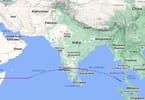The Air Transport Association (IATA) has said it is predicting that airlines will lose US$5.2 billion in 2008, due to slowing demand and high oil prices. Fuel is expected to rise to 36 percent of operating costs, up from 13 percent in 2002.
IATA also announced industry traffic data for July which showed a continued slowing of demand. July year-on-year passenger demand growth fell to 1.9 percent – the lowest in five years. Capacity increased by double that – 3.8 percent – indicating that service cuts are not keeping pace with the fall in demand. This pushed the load factor for the month to 79.9 percent, a drop of more than 1 percent compared to July 2007. The surprise of July was a 0.5 percent drop in passenger demand by Asia-Pacific carriers partly attributable to a change in Chinese visa requirements but also showing that economic weakness is spreading to previously robust economies.
Cargo demand in July contracted by 1.9 percent compared to 2007. Asia-Pacific carriers – the largest players in the cargo market – were hit hard with a 6.5 percent drop in demand.
As a result of the weaker economic outlook, IATA significantly revised downward its traffic forecast for domestic and international markets combined. Passenger traffic is now expected to grow on average by 3.2 percent (was 3.9 percent) and air freight volumes by just 1.8 percent (was 3.9 percent). This is only half the pace of expansion seen in 2007 and is boosted by the stronger growth seen at the start of the year. Strong traffic growth allowed the industry to partly absorb the rise in fuel costs from 2003-2007. This is no longer the case.
North American carriers are expected to post losses of US$5.0 billion in 2008 making them the hardest hit by this industry crisis, Asia Pacific is expected to see profits shrink from US$900 million in 2007 to US$300 million this year, European profits will tumble seven-fold from US$2.1 billion in 2007 to US$300 million in 2008, Middle Eastern profits will drop by US$100 million to US$200 million, and Latin American and African carriers will see losses deepen to US$300 million and US$700 million respectively.
“This crisis is re-shaping the industry in more severe ways than the demand shocks of SARS or 9/11. When fuel goes from 13 percent of your costs to 40 percent in seven years with an increased cost implication of US$183 billion, you simply cannot continue to do business in the same way. Fundamental change is needed,” said Bisignani. “Airlines have reduced non-fuel unit costs by 18 percent since 2001. Airports and air navigation service providers must join the effort. Efficiency gains are critical but cannot fully absorb the impact of skyrocketing fuel prices,” said Bisignani. “This crisis is highlighting the need for greater commercial freedom. Airlines are facing enormous challenges. To be successful and continue providing jobs to 32 million people and supporting US$3.5 trillion in economic activity, airlines must be able to do business like any other business,” said Giovanni Bisignani, IATA’s director general and CEO.
“More airlines have gone bust in 2008 than in the aftermath of 9.11. To cure the structural sickness of the industry, made all the more obvious by the high price of oil, we need a strong dose of liberalization. The US-EU talks later this month are one opportunity to address ownership restrictions in an important market. And IATA is taking the unusual step of facilitating a global dialogue on an Agenda for Freedom next month in Istanbul. Simply weathering the current storm is not an option. We must take the opportunity of these extraordinary times to facilitate extraordinary change to strengthen the industry with normal commercial freedoms,” said Bisignani.
WHAT TO TAKE AWAY FROM THIS ARTICLE:
- This is only half the pace of expansion seen in 2007 and is boosted by the stronger growth seen at the start of the year.
- When fuel goes from 13 percent of your costs to 40 percent in seven years with an increased cost implication of US$183 billion, you simply cannot continue to do business in the same way.
- To cure the structural sickness of the industry, made all the more obvious by the high price of oil, we need a strong dose of liberalization.






















